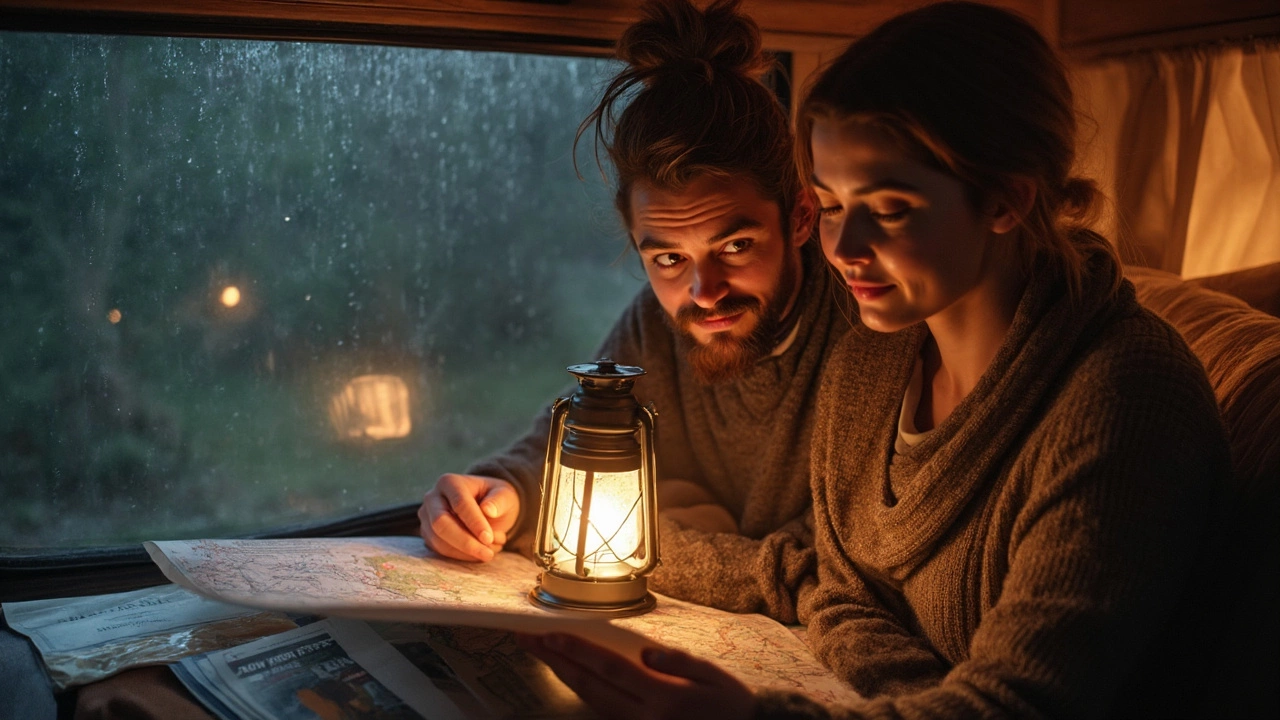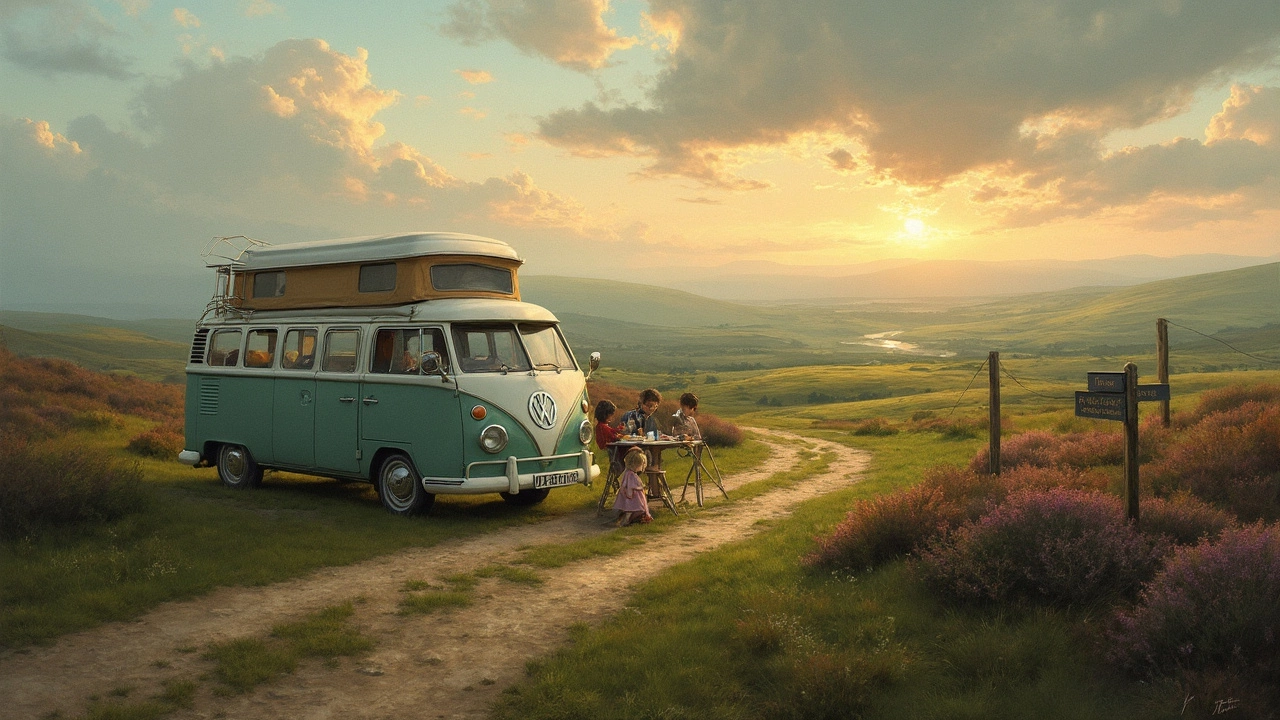You might think you can just find a quiet spot in the UK, park your campervan, and get a peaceful night's sleep—no questions asked. But the reality is a bit trickier. Unlike some countries where wild camping is almost a right, rules in the UK can catch you off guard.
Here, boondocking—just parking your camper somewhere that's not an official campsite—sounds easy, but it's tangled up in all sorts of laws. In most places, land is privately owned, even if it looks like open countryside. This means you usually need the owner's permission to camp overnight, whether you’re in a van, motorhome, or pitching a tent out of sight.
There are a few exceptions, and some areas are more relaxed (or just look the other way), but don't count on being able to park up anywhere you fancy. It’s not just about avoiding a fine—you don’t want to be woken up by someone asking you to move at 2 a.m. Knowing the basics about where you stand helps keep your adventure stress-free and legal. Let's get clear so you can plan your stopovers without worries.
- What Counts as Boondocking in the UK?
- The Legal Side: Where is Boondocking Allowed?
- Tips to Stay Out of Trouble
- Best Alternatives for Off-Grid Camping
What Counts as Boondocking in the UK?
In the UK, when people talk about "boondocking," they're mostly talking about staying overnight in a campervan or motorhome outside of a regulated campsite. It's also called wild camping, off-grid camping, or free parking—just in case you see those terms online or on vanlife forums.
But not every country treats boondocking the same way. In the US or Australia, you might be able to camp in national parks or public lands without a problem. Over here, it isn’t so straightforward. Most land in England, Wales, and Northern Ireland is privately owned. Scotland is a bit looser, thanks to its right-to-roam laws, but even there you’ve got to follow some basic rules and be considerate.
Boondocking can mean:
- Parking your van in a layby (those little roadside pull-offs)
- Staying overnight in a secluded forest car park
- Setting up in a remote field or on a cliff edge overlooking the sea
- Sleeping in your camper on a town street or supermarket car park (sometimes allowed for a night)
It’s not wild camping if you’re in a formal campsite with toilets, hookups, or a reception office. What matters is that you’re somewhere unofficial, often without facilities. Here's a quick breakdown of popular spots and whether you might get away with a night or not:
| Spot Type | Commonly Tolerated? | Risks or Rules |
|---|---|---|
| Layby/Pull-off | Mixed | Short stays; keep low profile; local council can fine or move you on |
| Forestry Car Park | Occasionally | Some close gates at night, many have “No Overnight” signs |
| National Parks (England/Wales) | Rarely | Majority is private land; you need landowner permission |
| Scotland (remote areas) | Common | Allowed with responsible behavior under access laws |
| Supermarket Car Parks | Sometimes | Depends on specific store policy; ask the manager upfront |
It’s definitely not a one-size-fits-all situation. Your experience can change based on the region, the exact spot, the time of year, and how you behave. Some areas even have height barriers to keep campervans out, and in busy holiday spots, locals are less tolerant because of past bad experiences. Being discreet helps—think no tables and chairs out, no loud music, and always clean up after yourself.
The Legal Side: Where is Boondocking Allowed?
Let’s get right into it: the UK is strict when it comes to staying overnight outside official campsites. Most of the countryside, even the wild-looking stuff, is private land. In England and Wales, you generally can’t stay overnight (in a campervan, motorhome, or tent) unless you have permission from whoever owns the land. That means boondocking isn’t just rare—it’s usually not boondocking UK-style legal, at least not by default.
Here’s a quick overview of where things stand in different parts of the UK:
| Area | Boondocking Legal? | Notes |
|---|---|---|
| England & Wales | No (without permission) | Strict land ownership, enforcement varies. National parks don’t give a free pass. |
| Scotland | Yes (with big exceptions) | Legal on most unenclosed land under the Scottish Outdoor Access Code, but not in motor vehicles near roads. Special byelaws affect Loch Lomond & Trossachs. |
| Northern Ireland | No (without permission) | Very similar rules to England & Wales. Private land, almost everywhere. |
Scotland is the famous exception. Thanks to the “right to roam,” wild camping is legal on unenclosed land, but that doesn’t mean you can just pull your van to the side of the road and sleep. The law specifically says camping means staying in lightweight tents, away from roads or buildings. If you’re in a motorhome or camping on a roadside verge, it’s still usually not allowed without permission. There are mapped zones (like Loch Lomond) that are totally off-limits even for tents in some seasons.
In the rest of the UK, you’re taking a risk if you park up anywhere that’s not a serviced official campsite, an approved pub stopover, or a dedicated motorhome area. Some spots look relaxed but you can get a knock on the window, a fixed penalty notice, or even find barriers blocking you in or out. Car parks are also a grey area. Councils often signpost rules—some allow overnight stays, most don’t, or charge a hefty penalty if you stay past 11pm.
- Always check local authority rules and signs—they change often
- Some farm shops, pubs, and businesses advertise space for overnight parking if you ask or buy something
- Use aires or “Brit Stops” guides for legal, safe places (especially in England & Wales)
Bottom line: unless you’re in Scotland (and have double-checked local byelaws), don’t assume you can boondock just anywhere. It’s worth asking for permission, checking community forums for up-to-date tips, and keeping a backup plan in case your spot isn’t as free as it looks.

Tips to Stay Out of Trouble
Staying worry-free while boondocking around the UK comes down to knowing the basics and showing a bit of common sense. Following these straightforward tips can help you avoid headaches, fines, and late-night knock-on-the-windows from police or angry landowners.
- boondocking UK law: Always check local bylaws. Many councils in England, Wales, and Northern Ireland have strict bylaws banning overnight parking or sleeping in vehicles on public roads and car parks. Scotland is more laid-back, thanks to the Land Reform Act, but even there, parking bans can still pop up.
- Ask first: If you park on private land, seek the owner’s permission. This covers everything from farms and pub car parks to random fields. Most people are friendly if you ask up front—and some might even invite you in!
- Keep it low-key: Don’t roll out chairs, light a fire, or act like you’ve moved in for a week. Staying under the radar reduces the chances of complaints, especially in popular tourist spots.
- Leave no trace: Respect the space by taking all your rubbish with you, not dumping wastewater, and leaving the site cleaner than you found it. Councils especially clamp down after messy campers moved through.
- Use apps and sites: Apps like Park4Night, Campercontact, and searchforsites.co.uk show places others have successfully stayed at, along with user reviews about how safe or welcome the vibe is.
- Watch for signs: Always look for “No Overnight Parking” signs. Ignoring one could land you a fine between £60 and £100, depending on the council. A few unlucky folks have even found themselves clamped.
Here's a quick rundown of penalties and what you can expect if you ignore the rules in each UK nation:
| Region | Common Penalty | Local Approach |
|---|---|---|
| England | Fines (£60–£100), eviction | Strict in cities and tourist areas; rural is variable |
| Wales | Similar to England | Popular coast/tourist sites are monitored |
| Scotland | Eviction, rare fines | Generally open-minded, but follow local signs |
| Northern Ireland | Fines, eviction | Urban areas and touristy spots monitored |
Last but not least, don’t be afraid to move on if it feels wrong. Sometimes you just won’t get a good vibe or locals seem annoyed. Trust your gut, avoid trouble, and you’ll find plenty of friendly places to pull up for the night.
Best Alternatives for Off-Grid Camping
So, full-on boondocking isn’t always possible in the UK. But you don’t have to give up that wild, off-grid vibe either. There are a bunch of alternative options where you can still avoid crowded campsites but keep things 100% above board.
One of the most popular choices is certified locations, called CLs (Certificated Locations) or CSs (Certificated Sites). These are small, low-key spots—usually just five pitches, sometimes on a farm or next to a pub. They’re part of schemes like the Caravan and Motorhome Club or Camping and Caravanning Club, and they’re all about peace and privacy. You’ll need a club membership, but it’s usually pretty cheap (around £50 per year). Lots of these sites feel super laid back, and the rules are more relaxed than at big parks.
Then there’s Brit Stops, which connects campervan and motorhome travelers with pubs, breweries, and even farm shops that let you stay overnight for free. All you really need to do is buy a drink or two (or a local pie—no one’s judging!). You do need their guide, which costs about £32.
If you want something close to wild camping, Scotland is your place. The Land Reform Act means wild camping really is legal in most of the Scottish countryside, as long as you respect the environment and stick to the Scottish Outdoor Access Code. But even there, you can’t always take motorhomes or campervans just anywhere—many council car parks in places like Loch Lomond or the Highlands now have signs banning overnight stays. So double-check before you park.
- Use boondocking UK Facebook groups to find up-to-date info and local-friendly spots—you’ll hear the latest on friendly pubs, farms, or even lay-bys other travelers have used with no trouble.
- Park4Night and Searchforsites apps are goldmines for finding off-grid spots, reviews from other campers, and details on where you might get moved on.
- If you’re stuck, look for truck stops or motorway service stations—some allow quiet overnight stays for a small fee (usually £10-£20), and it’s way better than risking a knock on the door.
Here’s a quick breakdown of what to expect from each option:
| Alternative | Average Cost | Facilities | Do You Need Membership? |
|---|---|---|---|
| Certified Locations/Sites (CL/CS) | £10-£20 per night | Water, waste, sometimes electric | Yes |
| Brit Stops | Usually free, buy something at the business | Varies, often none | Yes (Guide) |
| Scottish Wild Camping | Free | None | No |
| Truck stops/service stations | £10-£20 per night | Toilets, showers (sometimes) | No |
The bottom line? You don't have to be stuck booking crowded, stuffy caravan parks if off-grid is what you’re after. A little research means you can get pretty close to wild camping—and still stay within the rules.
